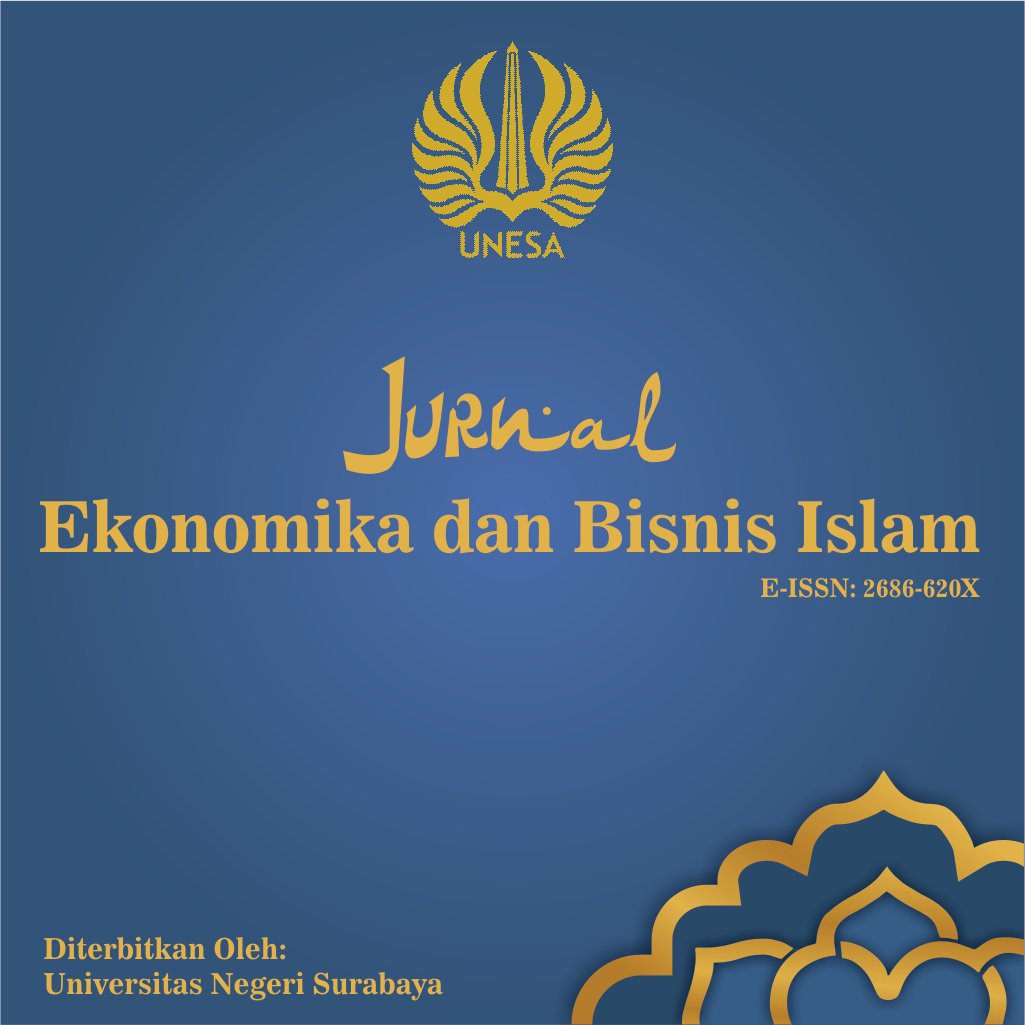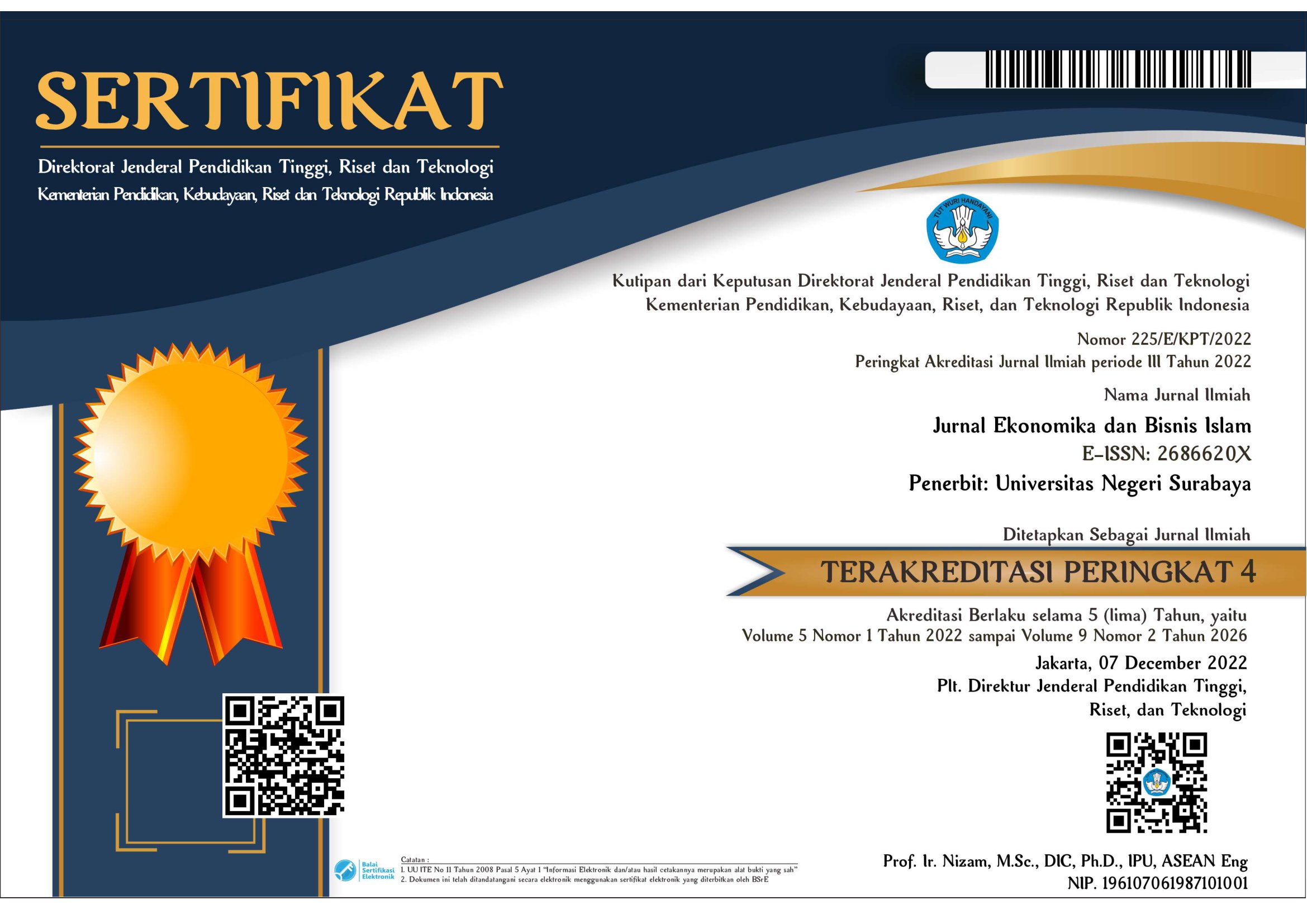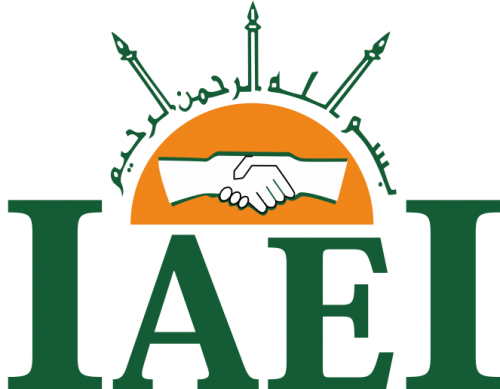Analisis Dampak Praktik Ihtikar Dalam Perdagangan Masker di Masa Pandemi Covid-19 (Studi Kasus Toko LailaQueen Surabaya)
DOI:
https://doi.org/10.26740/jekobi.v4n3.p147-159Keywords:
Ihtikar Practice, Buying and Selling, Haram, Islamic EconomyAbstract
Islam commands its people to work hard so as not to be lazy. In working there are rules that must be observed so as not to merely seek and gain profit in any way. One of the jobs used by several actors is mask actors who practice ihtikar. The practice of ihtikar or more often referred to as hoarding of goods is an activity of buying goods in large quantities with the aim of being stockpiled and resold when the price of the goods has soared. The purpose of this study is to determine the buying and selling behavior of ihtikar masks in an Islamic economic perspective. This type of research is field observation. Data collection methods using interviews and observation. The nature of this research is descriptive qualitative, that is, it describes the problems obtained through the facts on the hoarding of masks that occurred in the Lailaqueen Store which is seen from the point of view of Islamic economics. The results of this study are the practice of ihtikar carried out by the Lailaqueen Store starting from the covid-19 pandemic, and the type of goods stockpiled is One Care 3ply masks with medical quality. The purpose of this ihtikar practice is to gain multiple benefits, resulting in misery for others because masks are becoming scarce in the market.
References
Ad-Duwaisy, Ahmad bin Abdurrazaq. (2005). Fatwa-Fatwa Jual Beli. Pustaka Imam Asy-Syafii.
Al-Qardawi, Y. (2000). Halal Haram dalam Islam. Bina Ilmu.
Bariyah, O. N. (2018). Materi Hadist. Jakarta: Kalamulia.
Churiyah, M. (2011). Mengenal Ekonomi Syariah. Surya Pena Gemilang
Fasiha. (2017). Analisis Hukum Ekonomi Islam Terhadap Praktek Ihtikar. Islamic Economic, 2(2), 111127. http://ejournal.iainpalopo.ac.id/index.php/alamwal/article/view/479
Mahendra, F & Rahaditya, R. (2020). Urgensi Penemuan Hukum Oleh Hakim Sebagai Upaya Untuk Mewujudkan Keadilan Dan Kepastian Hukum Dalam Penanganan Kasus Penimbunan Masker dan Hand Sanitizer Di Masa Wabah Covid-19. Jurnal Hukum Adigama. 3(2), 1021. https://journal.untar.ac.id/index.php/adigama/article/view/10603/0
Muslich, A. W. (2010). Fiqih Muamalah (Cet.3). Amzah. h.180
Mutmainah, S. (2019). Penimbunan Barang Dagangan Ditinjau Dari Ekonomi Islam (Studi Kasus Pasar Merapi Seputih Mataram Lampung Tengah). https://repository.metrouniv.ac.id/id/eprint/48/
Peraturan Presiden Republik Indonesia Tahun 2015 Tentang Penetapan dan Penyimpanan Barang Kebutuhan Pokok dan Barang Penting.
Putri, N. R. (2020). Indonesia dalam Menghadapi Pandemi Covid-19. Jurnal Ilmiah. 20(2), 705. http://ji.unbari.ac.id/index.php/ilmiah/article/view/1010/0
Sholihin. (2019). Analisis Penimbunan BBM Oleh Pengecer Ditinjau Menurut Undang-Undang No 191 Tahun 2014 Dan Hukum Islm (Ihtikar). (Studi Kasus di Lamno Kecamtan Jaya Kabupaten Aceh Jaya). Jurnal Justisia: Jurnal Ilmu Hukum, Perundang-Undangan Dan Pranata Sosial, 2(191), 184199. https://www.jurnal.arraniry.ac.id/index.php/Justisia/article/view/5969/3710
Sukur, H. dkk. (2020). Penanganan Pelayanan Kesehatan Di Masa Pandemi Covid-19 Dalam Perspektif Hukum Kesehatan. Jurnal Inicio Legis. 1(1), 4. https://journal.trunojoyo.ac.id
Wahyuni, A. (2016). Penimbunan Barang Dalam Perspektif Hukum Islam. Al Iqtishad: Journal of Islamic Economics, 2(2). https://doi.org/10.15408/aiq.v2i2.2490
Wardiah, M. L. (2013). Dasar-Dasar Perbankan. Pustaka Setia.
Yuliadi, I. (2016). Ekonomi Islam. LPPI.
Downloads
Published
How to Cite
Issue
Section
License
This work is licensed under a Creative Commons Attribution 4.0 International License.
 Abstract views: 695
,
Abstract views: 695
, PDF Downloads: 1750
PDF Downloads: 1750














